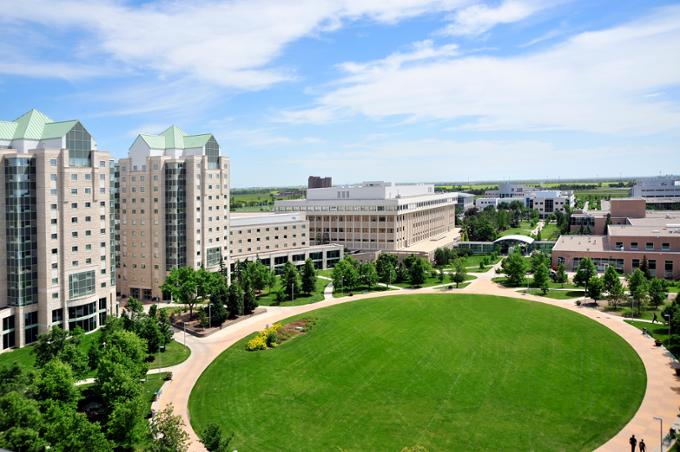
Undergraduate Certificates
Certificate and Diploma Programs
Ever wondered how you can get a university credential within 1-2 years? Or how you can make yourself stand out from the crowd when applying for your dream job? What if you aren't sure you want to commit to a degree program or aren't sure what you're interested in?
Certificates Give You Options
Certificates are great options if:
- You want to earn a university certificate in a specific field of study.
With subject areas including Public Relations and Communications, Local Government, Administration and more, you can earn a certificate to add to your résumé that helps you grow your knowledge and skills and expands your career options. - You're unsure what you want to take.
Start with a Certificate in Liberal Arts or Administration to try out different courses while still working towards a credential; then, those apply the credits to your future program of choice. - You want to earn credentials for your résumé as you work toward a degree.
Depending on your field of study, you may be able to take incremental steps towards your degree. Interested in a Business Administration degree, but want to earn certificates and a diploma along the way? Apply the credits you earn in the Administration Certificates, Levels I and II and the Business Diploma to your end goal - a Bachelor of Business Administration. - You have some university credits.
Did you take university courses previously, even at a different institution? You may be able to transfer those credits to a UofR certificate program, such as Liberal Arts, and be closer to a credential than you think! - You want to use your degree program electives to earn a certificate.
Several UofR certificates, such as the Certificate in Public Relations or the Nonprofit Sector Leadership and Innovation Certificate, can be taken at the same time as your U of R degree program or as a concurrent program. Use your open electives to meet both the certificate and degree program requirements. You then convocate with a certificate and a degree to add to your résumé.
In every case, talk with your advisor early in your program. They will help you build the path to meet your personal goals.
Certificates are Flexible
Certificates can generally be completed in one to two years. Plus, several certificates can be completed online or completed at colleges throughout the province. Need evening or weekend classes? Find many of these options within certificate programs as they are designed with you in mind!
Online and Remote Certificate Highlights

100% ONLINE
Public Relations
Take this 1-year certificate program completely online to break into or get ahead in the vibrant communications industry. Choose to complete the certificate program using your degree program's open electives. Common combinations include Administration, Fine Arts and Kinesiology degree programs. Want to level up and specialize your PR and communications management skills? Take the Advanced Certificate, available online or in-person.

100% ONLINE
Local Government Administration
Interested in becoming a municipal administrator in a town or city near you? Meet the requirements to find a lifelong career in a unique and in-demand role in Saskatchewan with this online, 5-course program. Deepen your knowledge with the Advanced Certificate.
Business, Communications and Liberal Arts Certificates and Diplomas
Find your career path in business, communications and public relations or liberal arts. Not only are these certificates and diploma programs direct paths to undergraduate certificates, but they give you the skills and knowledge needed for so many careers.
Business
Liberal Arts
My Public Relations Certificate experience was incredible. The instructors are real word communicators and all of the projects really enhanced my communication skills. The PR Certificate paved the way for me to pursue my passion.
Education and Health

Helping Professions
Add on to your Education degree with a specialzed certificate to meet the needs of the ever-changing classroom.
Explore nursing and earn a certificate, all without admission to the Bachelor in Science Nursing (SCBScN) degree.

Certificates in Partnership with First Nations University of Canada
Business and Communications (with FNUniv)
Languages and Education (with FNUniv)
Student Hub
Chat With an Advisor
Admission Requirements
Apply for Graduation
Study Off Campus
FAQ for Centre for Continuing Education Undergraduate Students
Concurrent programs are certificates or diplomas taken alongside your degree or diploma and are a completely separate credential you can be awarded. Take a program concurrently by using your open electives in your degree or diploma program to take the required courses for a certificate program.
When to Declare a Concurrent Program
- Students interested in a concurrent program should start planning early in their program. In fact, starting early is a good practice because the requirements are more likely to fit into your primary program better.
- Students further along in their primary program studies who want to declare a concurrent program need to do so at least one term before their last academic term. This is to guarantee that all signatures required are received and to make sure the option to apply to graduate with the desired concurrent program shows in the online Grad App through UR Self-Service.
- If a student does not inquire or reach out to have their concurrent program declared within enough time, we cannot guarantee the student will be able to graduate with the concurrent program during their desired graduation timeline.
When to Complete a Concurrent Program
- Generally, the concurrent certificate or diploma is completed them either before you graduate with your primary program or graduate with them at the same time as your primary program.
Requirements to Enter a Concurrent Program
- If you are already admitted to another Faculty or Program and wish to also take a Certificate Program, complete the Application for Undergraduate Concurrent Program Form (PDF) and take it to your faculty advisor. Your advisor then knows you working toward another program and allows them to provide the appropriate services.
Learn more about Applying for a Concurrent Program
The University of Regina reserves the right to refuse admission even when the stated requirements for entrance have been satisfied. The decision of individual faculties on the granting of admission, re-admission, transfer and transfer credit is final.
For more information, talk to your academic advisor after you are admitted/re-admitted.
Completion Letters
Some students may require a letter of completion after finishing the last class of a certificate prior to graduation for the following reasons:
- To apply for a post-grad work permit
- Study permit is expiring within a week or has already expired
- For employment purposes
Completion letters must be requested. They are not automatically sent to students.
- Submit an application for graduation in UR Self-Service. This must be completed before a completion letter can be issued.
- Ensure all your final grades have been entered in UR Self-Service. A completion letter cannot be issued until all final grades are available.
- Complete and submit the Undergraduate Certificate Completion Letter form.
See the table below for completion letter request deadlines and issue by dates.
The date you will receive your completion letter depends on:
- the term you completed your program,
- the term you will be graduating, and
- when you submitted your graduation application.
Completion letters will be issued by the dates below. Please contact Student Services if you have not received your completion letter after this date. Completion letters cannot be issued before final grades are available and you have completed your graduation application.
| Term Program Completed | Last Day of Term | Graduation Term | Grad App Submitted By: | Completion Letter Issued By: |
|---|---|---|---|---|
| Fall | December 31 | Spring Graduation | January 31 | Feburary 28 |
| Fall Graduation (of the following year) | July 31 | March 31 | ||
| Winter | April 30 | Spring Graduation | January 31 (before term program completed) | June 30 |
| Fall Graduation | July 31 (before term program completed) | July 31 | ||
| Spring | June 30 | Fall Graduation | July 31 | August 31 |
| Spring Graduation (of the following year) | January 31 | October 15 | ||
| Summer | August 31 | Fall Graduation | July 31 (before term program completed) | October 31 |
| Spring Graduation (of the following year) | January 31 | November 30 |
Prior Learning Assessment and Recognition (PLAR) at the U of R
Prior Learning Assessment and Recognition (PLAR) awards credit for learning you have acquired through your professional and personal life, skills training and volunteer experiences. No matter where your knowledge comes from, PLAR allows you to apply your vast amount of knowledge toward University of Regina degrees, certificates or diplomas.
Prior Learning Assessment and Recognition is for those who have acquired significant knowledge and skills outside the formal university classroom.
Talk to your faculty advisor to determine your elibigility.
Credit will not be awarded for exprience alone. Students must clearly demonstrate an ability to critically reflect on knowledge gained through experience. It is not a way for students to avoid taking a class. PLAR is for earning credit where credit is due and to avoid duplicate learning of knowledge students already have.
- PLAR credit will be assessed and awarded for undergraduate-level, university credit programs only.
- For information about graduate programs, please contact the Faculty of Graduate Studies and Research.
To Apply
- Determine eligibility - talk to your Faculty Advisor
- Book an appointment with a PLAR Mentor or call Centre for Continuing Education Student Services at 1-306-585-5807.
- Create a portfolio
- Submit portfolio for assessment (and pay the assessment fee)
Getting Your Results
- You should have your results by the end of the term in which you apply, as long as the portfolio is submitted by the end of the first month of the term.
- Be mindful about timing and sequencing. If you need results for a prerequisite for another course, you need to ensure you are following appropriate timlines.
- Consult with your PLAR Mentor and/or your faculty advisor or practicum placement coordinator.
On your transcript, PLAR credit appears like transfer credit. It will note you have PLAR credit for the course you've challenged. It will not show up like a regular course with a grade.
Appeal Process
If your PLAR application is not approved, there may be an appeal process, but each faculty handles this differently.
The fee is $288 per assessment. This is significantly less than paying for a course.
- This fee is instead of, not in addition to, regular tuition. It pays for the service and is non-refundable, even if your application isn't successful.
- The fee is charged to your account like tuition at the time you are ready to submit your completed portfolio for assessment.
Here are a few resources to help you develop your portfolio.
- PLAR Portfolio Guide (pdf)
- "PLAR at the U of R" presentation. (Use Prezi to view this presentation.)
The Faculty of Arts and the Department of Justice Studies have created this comprehensive guide (pdf) specifically for students seeking PLAR for JS290 (Introductory Practicum) and JS490 (Advanced Practicum).
Prior Learning Assessment and Recognition is a valuable support for our adult learners. Recognizing prior learning allows us to acknowledge the diversity of our students as well as to encourage non-traditional learners to participate in higher education.
As an assessor, you are responsible for ensuring students are awarded credit for their previous learning according to national and international best practices. Prior Learning Assessment at the University of Regina follows standards set out by the Council for Adult and Experiential Learning (CAEL), which ensure that learning is assessed and awarded in a fair, rigorous and transparent manner.
